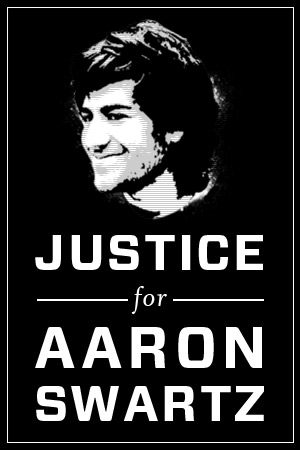Now this act sounds like it is truly meant to protect people from Computer Fraud and Abuse. However, the law was developed at a time when the personal computer was not as wide spread as it is now and the Internet as we know it did not exist. The law does not take into account the changing way that the internet and computers are used in today’s world. As an example if a friend of yours gives you their password to an online account (Facebook, Gmail, etc.) you have broken this law and can be prosecuted. If you are found guilty you can spend a few years in a Federal Prison according to the sentencing guidelines.
The ludicrous and antiquated nature of this law is exceptionally obvious to anyone that takes the time to read it. It follows the typical broad and vague wording that the government and corporations like so they can threaten and prosecute anyone that steps outside of the boundaries they are happy with. This was the case with Aaron Swartz who prosecuted for downloading too many manuals articles from a JSTOR website. The wording of the law was so vague that he was brought up on charges of violating the terms and conditions of the site and also wire fraud… One representative found it so outlandish that he made this comment:
 “The government was able to bring such disproportionate charges against Aaron because of the broad scope of the Computer Fraud and Abuse Act (CFAA) and the wire fraud statute. It looks like the government used the vague wording of those laws to claim that violating an online service’s user agreement or terms of service is a violation of the CFAA and the wire fraud statute.
“The government was able to bring such disproportionate charges against Aaron because of the broad scope of the Computer Fraud and Abuse Act (CFAA) and the wire fraud statute. It looks like the government used the vague wording of those laws to claim that violating an online service’s user agreement or terms of service is a violation of the CFAA and the wire fraud statute.
Using the law in this way could criminalize many everyday activities and allow for outlandishly severe penalties.”
This type of abuse of the law is ethically wrong on so many levels, but it is also what some in the US Government want. They want that level of control and ambiguity so that they can put fear into the people that are using the internet even for legitimate purposes. This is why you see the same broad and open wording in bills like CISPA. This way they can expand the limits of the law based on their own needs. We have seen them do this over and over again, seizing domain names and holding them for months with no real evidence of any wrong doing. Entrapping other sites (as in the case of Mega Upload) so that they can attempt to destroy their business model and send a message to other companies that might want to follow in their footsteps.
In short the US Government urged by corporate lobbies are trying to get a strangle hold on the Internet in the same way they did wired communication and print media in the 70s-80s. They want to make sure that you are not free to post what you want; when you want and under any name you chose (in fact using a pseudonym is illegal under the CFAA). It is scary thing for them to see information flowing so freely around the world. Everything from videos of abuse of power to sharing of cultures (and we are not talking about movies and TV). This is not the environment they want here, but they do not have the power, authority or tools to control this method of communication and this scares them in many ways. The Internet has been use to organize protests around the world and even revolutions in countries that had very oppressive governments. Perhaps it is this that causes so much fear in our lawmakers that they feel the need to draft laws that give them unprecedented control and license to monitor the internet. Then again, maybe it is just greed wrapped up in a national security bow. No matter what their reasons the laws MUST be changed as they no longer represent the reality of the information age.
If you want to help you can by telling your representatives to fix this law now.
Discuss this in our Forum




